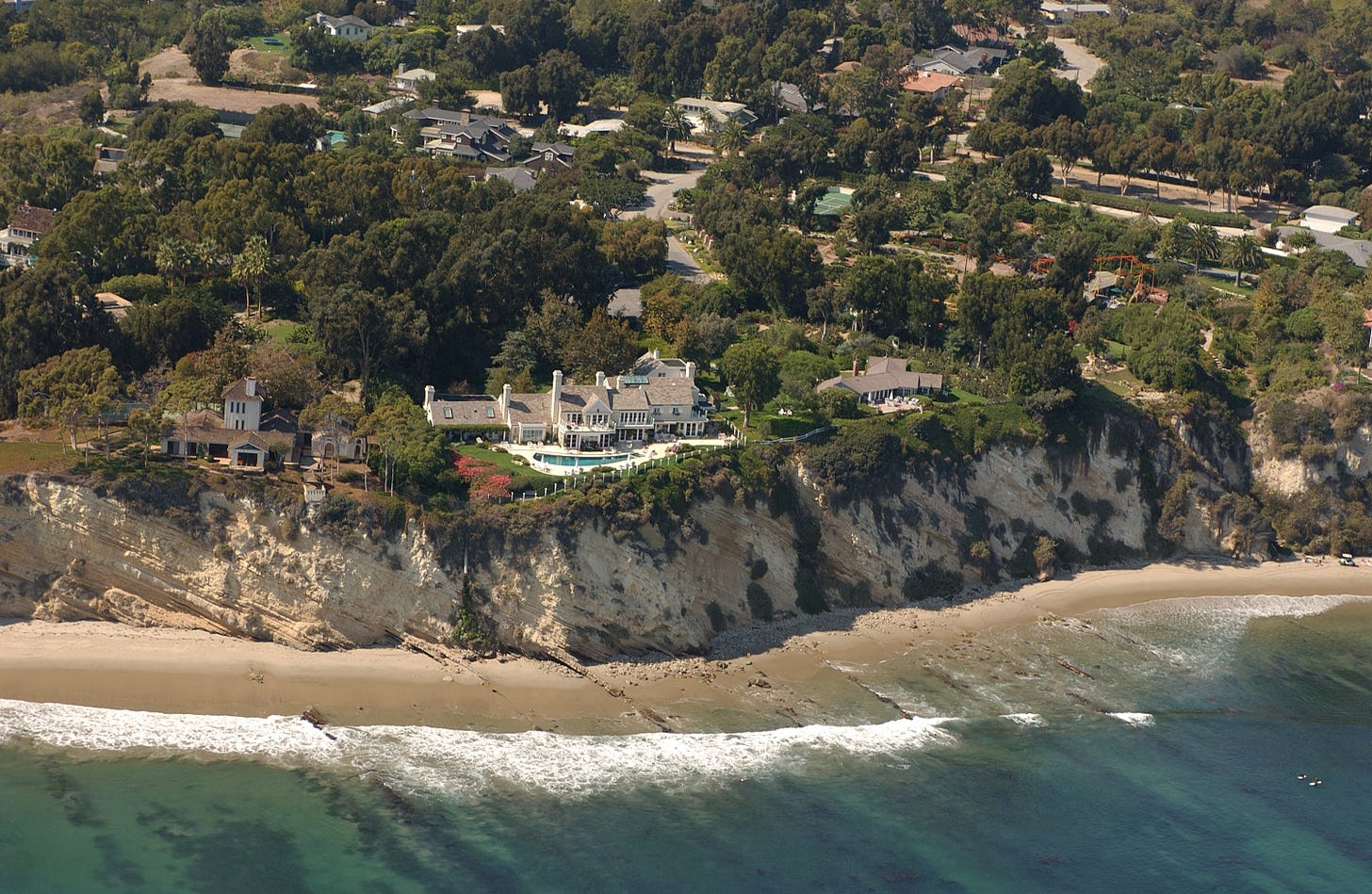The Streisand Effect is a phenomenon in which trying to hide or draw attention away from something only serves to draw more attention to it. It was named after Barbara Streisand, and her attempts to suppress publication of pictures of her home, which only led to more people looking it up – people who’d never have bothered otherwise.
“One often meets his destiny on the road he takes to avoid it.”
Master Oogway
Of course I’m going to post what the home look like:
Surprisingly, the North Korean leadership seemed unaware of the Streisand Effect in 2014. Sony Pictures was on the verge of releasing a mediocre comedy film- The Interview, starring Seth Rogen and James Franco. The plot revolved around an interview of North Korean leader Kim Jong-un and an assassination attempt.
In all likelihood, it would’ve sunk without a trace, but North Korea, ostensibly through a hacker group, demanded the film not be released, threatening attacks at cinemas screening it. They also leaked more than 10 TB of internal Sony Pictures data. This data was explosive - personal information about Sony Pictures employees and their families, emails between employees, information about executive salaries at the company, copies of then-unreleased Sony films, plans for future Sony films, scripts for certain films, and other information.
Sony Pictures gave in and pulled the film from a theatrical release, inviting criticism from several Hollywood filmmakers, actors, and television hosts, including Ben Stiller, Steve Carell, Rob Lowe, Jimmy Kimmel and Judd Apatow. Not to mention Barack Obama.
A lot of people, including yours truly, ended up watching the film on streaming platforms. For the record, I hated it. But that’s not the point of today’s post.
Among the various documents and emails leaked, there was a fascinating memo from Dave Goldberg, media executive and, incidentally, husband of former Facebook COO Sheryl Sandberg. An excerpt:
Music is becoming a purely digital product. A digital- only recorded music company will be a much more profitable one after one-off restructuring costs. It will have lower revenue and higher margins. Its revenue will be very stable and grow with the overall digital music market growth.
It will be a much more valuable company with its revenue base solidly coming from subscription and ad revenue. It will be valued like music publishing companies or cable channels, not like recorded music companies today. Margins for recorded music should eventually be above 40% on that lower but growing revenue base.
Catalog provides 50% of the revenue and 200% of the profits of recorded music.
Dave lays out the future of the music industry, why collaborating with Spotify and others is a good thing for Sony, and how their focus should be on monetizing their existing catalog, prioritizing it above all else.
The Taurani brothers of Tips Industries seem to have read the memo. Or they probably reached the same conclusion as Dave, albeit a bit later. They have spun off the filmmaking business into another entity, and the original company is basically a catalog of their hit songs from the 80’s, 90’s and 00’s.
They have also struck a tie-up with Warner Music (One of the global big three of music, along with Universal Music group and, of course, Sony). On Tips’ behalf, Warner has negotiated revenue sharing deals with the biggies -Spotify, Meta and others.
The result?
That’s a 70x jump in stock price in 5 years. And Tips’ P&L is almost exactly as the memo predicted.
Unfortunately, Dave passed away in 2015 at just 47.
Intelligent, prescient and insightful, his death was a great loss. Of course, he’d had a storied career, at Bain, Capital Records, Yahoo and even Benchmark Capital. But more touching is how many of his eulogies described him as kind:
Mark Zuckerberg, Facebook's chief executive, said in a post that Goldberg was "an amazing person and I am glad I got to know him." "One of the truly great people on the planet, Dave was of almost unimaginably remarkable character," said Dick Costolo, Twitter's chief executive. "One of kindest and most generous friends I've known," said Jeff Weiner, chief executive of LinkedIn.
You can read the whole memo here.
This post is for information purposes only, and should not be interpreted as investing advice. The author may hold positions in the securities discussed.







As someone who knew a bit about the going ons (of is it goings on) in the sector, the spike in Tips is not a surprise. It was inevitable. Do I have a single stock? No.
Nicely done, though the part about kindness escapes me. I do not have empathy or kindness. It is a waste of time. Why be kind when you can be mean?
One can never go wrong with a Master Oogway quote-reference.
Enjoyed it!